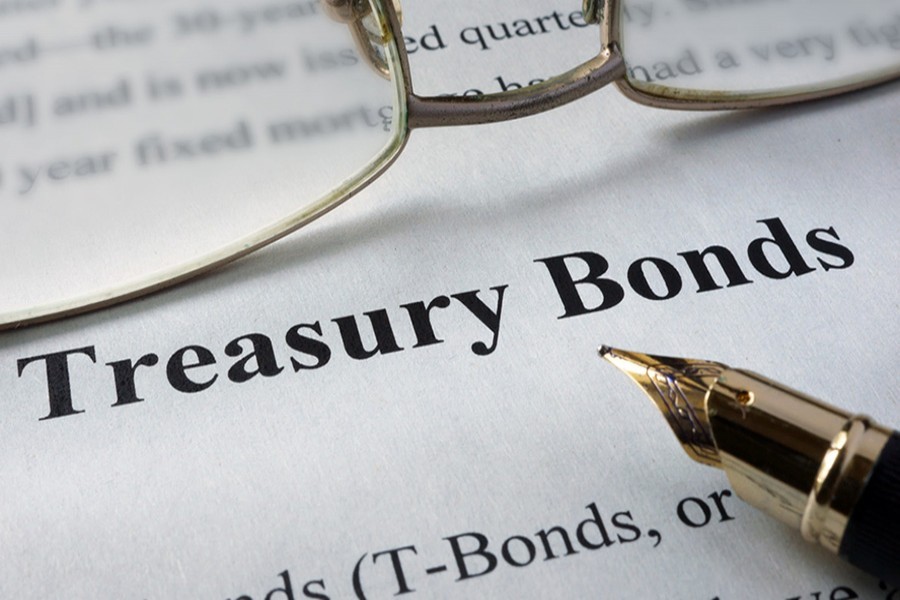Much-hyped trading in treasury bonds on the market may begin soon as the stakeholders completed most of the procedures, including mock trading, stoking hopes about a rebound of the bourses.
The bonds never traded on the secondary market and remained a hot topic in the financial-market circles.
It is believed that trading in the government securities (G-Sec) with over 250 bonds up for grabs will help deepen the market, opening up opportunities for both retail and institutional investors in the risk-free fixed-income instruments.
"We have completed more than 95-percent works on the path of going live," says Dr Shaikh Shamsuddin Ahmed, a member at the Bangladesh Securities and Exchange Corporation, the country's stock regulator.
He hopes to "go live later this month".
He said a final test run with all the instruments will take place this week. "We've conducted a number of mock tests with the instruments".
Earlier, there were mock tests for a single instrument and multiple ones.
He said the mock trading may last 10 minutes to a few hours.
Earlier, all stakeholders signed a key operational agreement with the Ministry of Finance in June last.
The country's stock exchanges are now dominated by equity instruments as only nine fixed-income corporate bonds remained listed with the prime bourses.
Earlier, 222 government bonds, with an aggregate value of Tk 550 billion, were listed with the premier bourse of Dhaka Stock Exchange (DSE) between 2005 and 2011. But trading did never take off. The treasury bills whose tenors are less than one year will not be traded.
In the absence of secondary transactions, the Bangladesh Bank introduced alternative secondary trading in the bonds through MI Module wherein some banks participated.
"This is not truly a secondary market of the T-bonds as the participants are limited among the banks," said an official at the debt-management department of the central bank.
Such trading within the interbank ecosystem under the market-infrastructure module of Bangladesh Bank does not reflect secondary transactions.
Institutional shareholders, including banks and financial institutions, usually participate in the MI module.
Shahidul Islam, chief executive officer of VIPB Asset Management Company, told the FE that the general public is very keen on the T-bonds as they are risk-free and buy/sale unlimited.
Investment in the national savings certificates is also risk-free. But for those who lack liquidity investing in treasury bonds will have liquidity as investors can buy and purchase any working day, Mr Islam notes.
"The general investors will get another option through the fixed-income instruments," Mr Islam says, adding that there are many individuals who buy such bonds and bills through banks.
"On institutions' front, they will get also another area to invest in."
Syed Al Amin Rahman, a senior official at the DSE, who is familiar with the development, told the FE that this will be a great achievement for the market as Bangladesh has been lacking in a bond market
"We have some corporate bonds but, in a real sense, bond market trading will open after the launch of the government bonds," Mr Rahman said.
Those who are risk-averters may invest in the bonds, he hopes, adding that the investors usually invest by watching yields and ideal for the risk-averter.
President of CFA Society Bangladesh Md. Shaheen Iqbal notes that inflation is now high which may discourage investors from trading in such types of fixed-income instruments.
But he mentions that the yields on the bonds are increasing in recent times and investors may choose short-tenure bonds.
Investment for a long term may lose money as the price may fall.
Existing investors in treasury bonds have their holdings in the depository-participant accounts with the Bangladesh Bank. They will now need to transfer the holdings to any BO account to be able to sell them through stock exchanges.
The denomination of the bond will be Tk 100,000 and its trading pattern will be T+2, meaning there will be three days for final settlement.
As per the Bangladesh Bank Order 1972, the BB provides functional and advisory services to the Government of Bangladesh on matters related to government debt-management policy and the issuance of various treasury instruments.
To cover the budgetary deficits, the government borrows funds from domestic sources by issuing tradable and non-tradable securities.
Tradable securities, such as 14-day, 91-day, 182-day, and 364-day T-bills and 2-year, 5-year, 10-year, 15-year, 20-year T-bonds, and 3-year FRTB, are available on the market. Non-tradable securities include Sanchayapatras, Sanchayabonds, and Prize Bond.


